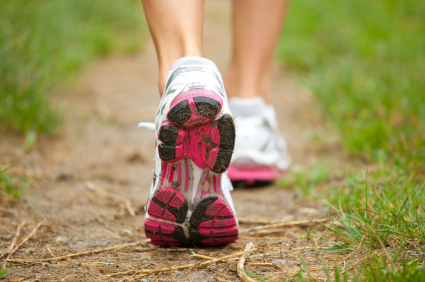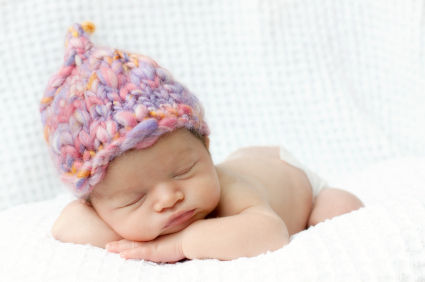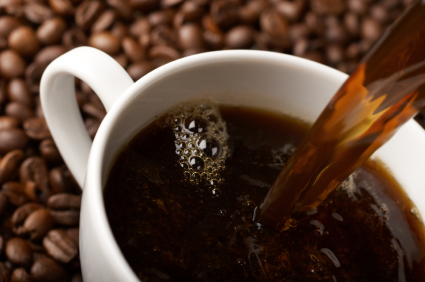Depression: Walking the Walk
I’m always on the look out for evidence-based alternatives to drug therapy — not because I believe that drugs are bad — but because I believe that sometimes there are safer ways to manage certain conditions, ways that may minimize side effects or interactions. Moreover? We are a society that relies on a quick fix and sometimes, that quick fix brings on a host of other issues.
Depression and hormonal imbalance go hand in hand as much as love and marriage, babies and carriages, and yin and yang. As many as 40% of women are affected by depression during menopause, but there are other factors that come into play, including gender (women are 1.5 to 3 times likelier than men to report a lifetime history of depression), stress, family life, general health issues, a lack of exercise and genetics. Moreover, research has shown that how women perceive the effect of menopause and its symptoms on their physical health can significantly affect whether or not they develop depression at the start of the ‘pause.
When you think ‘depression,’ you probably think melancholy, sadness, feeling blue and out of sorts. But depression can also affect working memory and bring on persistent negative moods, which may not be easily resolved by drugs alone or by behavioral/psychotherapy alone. Consequently, being aware of alternative strategies may be helpful for some people. That’s why I was so intrigued by the concept of Attention Restoration Therapy (ART).
ART examines attention and divides it into two parts:
- Involuntary attention, in which our attention is somehow captured by some sort of stimulus that stands out
- Voluntary or directed attention, which is directed by specific mental processes and intellect
According to ART (which is backed and validated by scientific research) interacting with certain types of environments can promote or invoke involuntary attention; this allows our directed attention a replenishing respite, one that people with depression, who incidentally are more likely to be mentally and attentionally fatigued may benefit. Natural environments in particular, have been shown boost this attention shifting process in healthy individuals. More importantly, a small study that appears in the Journal of Affective Disorders shows that the same benefits may be obtained by clinically depressed persons. In fact, when both women and men were asked to take a 50 to 55 minute walk in an aboretum or an urban setting and deliberately asked to ruminate on a painful memory, they still scored higher on cognitive and attentional testing. After a second walk in an entirely different setting, nature walks were shown to boost both memory and mood.
Mind you, researchers still don’t know how long lasting the effects of nature are on depression, and if it matters if the person actually lives most of the time in a rural or urban setting. However, it does appear that when it comes to depression, walking the walk, especially if it’s in a natural setting, may boost mood and functioning and give attention a much needed rest.
Read MoreChasing the blues: music and mood
It’s widely accepted that depression affects as many as 20% to 40% of women during menopause. However, what’s also true is that gender differences in depression evidently begin well before the menopause and women are 1.5 to 3 times likelier than men to report a lifetime history of depression. Moreover, these distinctions start as early as the teen years and continue until the mid 50s, a time that corresponds to female reproductivity. Still, hormones are only one factor and mood can also be affected by stress, family life, general health issues, a lack of exercise and genetics. Moreover, research has shown that how women perceive the effect of menopause and its symptoms on their physical health can significantly affect whether or not they develop depression at the start of the ‘pause.
One thing that is fascinating about depression is while drugs have long been considered first line therapy, other alternatives, such as physical activity, have been shown to alleviate depression to a certain extent or at the very least, boost the effectiveness of pharmaceuticals. Listening to music may also be beneficial.
There are several theories behind the use of music in healing. One is that the slower, homeostatic rhythm of music slows down any elevated body rhythms. Another is that music actually alters psychological responses so that health outcomes, like depressed mood, are improved.
However, is there any muscle behind the claims that music can heal? A study appearing last year in Complementary Therapies in Medicine suggests it can. When researchers scoured nine databases, they identified data from 9, scientifically sound studies that enrolled participants in a wide range of ages from 18 to 95 years. And while there was no rhyme or reason the the duration of each listening session (30 to 60 min) or frequency of listening (2 to 3 times a day to once a week), nor was there a consistency between type of music listened to, 11 studies showed the listening to music improved depression and some demonstrated significant improvements, with scores improving by as much as 47% after 4 months. In some trials, improvements were seen as early as two weeks. Moreover? These improvements were measured by several different validated scales and were not based solely on participant recall.
While the studies did not necessarily examine music type, one compared the difference between rock and classical and found positive results in mothers who had become withdrawn. Others showed that having a choice helps; here, the researchers point out that choice helps the body to adapt and adopt musical patterns because the “listener is more in-tune” with preferred music.” (Pun intended!)
Clearly, there are distinctions between the data drawn from these studies which makes it impossible to draw any firm conclusions. At the same time, there is enough evidence to support the role of music as therapy in mood disorders. For me, a dose of prevention is worth a pound of cure. And this is the type of prevention that’s just ‘music to my ears!’
If music be the cure of mood, play on.
Read MoreMove it to lose it
 I mean it! New research suggests that if you want to hit that fatigue, depression, flashes and mood swings in one fell swoop, you may not have to resort to HRT. And the solution may be relatively simple: move.
I mean it! New research suggests that if you want to hit that fatigue, depression, flashes and mood swings in one fell swoop, you may not have to resort to HRT. And the solution may be relatively simple: move.
I can’t stress the importance of physical activity as we age enough. From bone health to heart health to mental health, it is the one accessible, equal opportunity strategy, regardless of income or geography. Because even if you don’t have entry to the gym, you can walk, run, bike, step, or engage in other activities that don’t require a membership or a monthly fee.
In face, researchers are reporting that simply engaging in vigorous physical activity, i.e. 7 days of a combination of moderate intensity/intense activities that add up to 3000 MET minutes a week) can significantly decrease menopausal symptoms, in particular fatigue, depression, insomnia and hot flashes. (Activity level is scientifically measured by units known as METs, or metabolic equivalents; vigorous activity is equivalent to 8 METs and moderate activity to 4 METs).
In a study of over 300 women between the ages of 45 and 60, the most active had about 75% lower menopausal symptom scores. Yet, exercising only moderately(e.g. 3 or more days a week of vigorous activity for at least 20 minutes daily or 5 or more days of moderately intense activity for at least 30 minutes a day) can also reduce strong menopausal symptoms, just not to the extent that more intense activity does.
The reasons behind the benefits of physical activity are pretty simple: your endorphins play a role in vasomotor symptoms and low levels are associated with increased release of luteinizing hormone (a hormone produced by the pituitary gland that is involved in ovulation), leading to hot flashes, heart racing, sleepless ness, anxiety and muscle discomfort. By raising your endorphin levels, even in light of declining estrogen, you stand a better chance at placing a roadblock in front of this process. However, this is only part of the story; body composition, mood and how well your themoregulatory system is functioning are also important.
Still, the message is clear: Move it to lose it, “it” being those trouble menopausal symptoms.
Read MoreWhen was the last time you slept
…like a baby?
Yawning again? It’s not daylight savings time, promise! In fact, it may very well be your mood, at least in part.
I’ve been writing about sleep (or lack thereof) and menopause since first starting this blog in 2008. Click on the link and you’ll see posts about causes, solutions, pillows, sheets, you name it. And yet, I wouldn’t be surprised if sleep eludes you from time to time as much as it does me. More importantly, I imagine that some of you in the Flashfree universe don’t sleep much at all.
What gives?
Anxiety. And depression. That’s what. At least according to new data appearing in the online version of Maturitas journal. This time, researchers in search of some answers about sleep difficulties in midlife examined medical records of 237 women in peri- and postmenopause, all of who were on average, 52 years old. More specifically, they delved into answer that the women had provided to previous questionnaires about their life quality (based on physical and mental health, life satisfaction and social involvement) and degree of anxiety and/or depression. Within these questionnaires were measures of menopause-specific symptoms as well as sleep issues, including difficulty falling asleep and sleep that was non-restorative.
Overall, and unsurprisingly, about 36% of the women expressed difficulty falling asleep and 44% nonrestorative sleep during at least half the week. Almost a third experienced both issues at least 3 nights a week. Yet, sleep difficulties were less associated with menopausal symptoms (night sweats, hot flashes, nausea, dizziness, muscle/joint pain, headaches) and rather, with psychological statse of being. Indeed, trouble falling asleep seemed to be mostly correlated with anxiety, while non-restorative sleep was linked to depression.
This is not the first time that researchers have linked mood disorders to sleep issues. And although the progression is not entirely clear, i.e. the time course over which depression and anxiety develop during the transition to influence sleep, what is clear is that treating the underlying issues may ultimately help improve sleep quality.
What about you? Do you find that feeling blue or anxious tends to rob you of much needed zzzs? Or are you more convinced that waking up drenched in sweat is what is messing with obtaining restorative sleep?
Inquiring minds…
Read MoreWednesday Bubble: chase the midlife blues away with a cup of java?
Coffee. The morning elixir that oh, so many of us rely on. Did you know that caffeine is the world’s most frequently ingested psychoactive substance?!
We’ve heard a lot about the blues and depression during midlife and menopause, with some experts saying that the two are connected and others, that they are not. However, regardless of whether or not menopause increases the risk for depression, it is clear that depression affects twice as many women as men, and at least 20% of all US women at some point during their lifetime. Hence, if there is an easy way to boost the success of antidepressants or behavioral or other strategies, I’m all for it. And it appears that coffee may be the part of the solution.
Coffee? Really?
In a newly published study in the esteemed Archives of Internal Medicine, researchers say that they followed over 50,000 women and examined their food intake including how often they drank caffeinated and decaffeinated coffee, tea and soft drinks and and ate chocolate. During the 10 years of the study, researchers identified slightly over 2,000 cases of depression. However, it appeared that drinking two to three cups of coffee daily reduced the risk of developing depression by 15% compared to drinking one cup a day or less. Women who drank four or more cups a day had a decreased risk of 20%. And decaffeinated beverages? No dice.
In so far as this study goes, it’s not conclusive and it could be possible that mildly depressed women drink less coffee. And keep in mind that too much of a good thing is well, too much. Studies have shown that long-term consumption of caffeine can lead to tolerance, meaning that you need greater amounts to achieve the effects that many of us crave. Nevertheless, so far, the results show that coffee may very well be mildly protective against depression.
English playwright and theatre director John Van Druten once said, “I think if I were a woman I’d wear coffee as a perfume.” I think I’d rather just drink it than wear it!
Read MoreWednesday Bubble: Got symptoms? Got milk? An udder disaster…
Milk is being touted as the next best thing, that is, when it comes to hormonal symptoms. In fact, a new campaign sponsored by the California Milk Processor Board centers around the claim that milk can help reduce the symptoms of PMS. EverythingIdoiswrong.com offers global gauges of PMS symptoms, packaged apologies for men who feel victimized by PMS and even analyzes or verifies their mistakes so that they can avoid them during the next cycle. In a piece about the marketing effort in the Washington Post, Executive Director of the California Milk Processor Board, Steve James, is quoted as saying that the strategy is to “disarm the situation surrounding PMS and its effects,” both for women and individuals around them who are suffering from their mood swings and other symptoms.
Say what?!!!
Is this advertising for milk or a drug claim?
According to the website, the claims about milk are derived from a review that appeared in the year 2000 in the Journal of the American College of Nutrition. In the review, the authors discuss the potential links between altered calcium balance and affective disorders, such as depression and anxiety. Because women with PMS reportedly have calcium fluctuations that interfere with hormonal balance, some researchers have hypothesized that this imbalance can lead to both mood and other features of PMS. In these studies, however, participants obtained their calcium through supplements and not through dietary means; this enabled the researchers to control and standardize intakes (which averaged as much as 1300 mg calcium daily). Translated into daily milk consumption, this means that a person would have to drink more than 4, 8 oz glasses of milk daily to achieve the level of calcium used in clinical studies.
Honestly, do you know anyone over the age of “tween” who consumes that much milk?
Regardless of the studies cited, the claims about milk are exaggerated and inconclusive. Many of the studies were poorly designed or relied upon recall. However, one has to wonder if the milk-PMS claims will set off a cascade of others that stretch to the other end of the hormonal spectrum –menopause — where too much calcium is believed to be too much of a good thing: although calcium may offer protection against osteoporosis, it may also increase the risk for heart disease in some women.
Let’s get away from the hard science for a moment and take a closer look at the campaign. The inference:
- Women: your PMS causes undue suffering to people around you, especially your male partners
- Men: humor the woman in your life. If you want to save your relationship, friendship, partnership, etc, create a photo with puppy eyes, film a video apology or better yet, make fun of her. Oh, and have her drink milk.
Don’t know about you but this one is so absurd it may not even be bubble-worthy. Hey California Milk Processor Board – you may want to add a few women to your marketing team. This one’s an udder disaster.
Hat tip to Reuters Health Executive Editor, Ivan Oransky for the campaign heads up. (I tried to milk it Ivan – how’d I do?!!)
Read More










